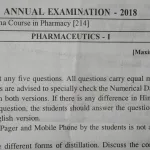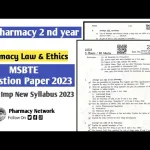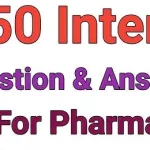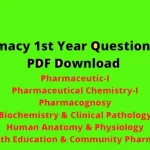Pharmacology helps us understand drugs, their uses, and effects on the body. This set of questions and answers provides a comprehensive guide for students and professionals preparing for exams, covering key topics and concepts in the field.
General Pharmacology
Question: What is pharmacokinetics?
Answer:
Pharmacokinetics is the study of how drugs are absorbed, distributed, metabolized, and excreted in the body.
Question: Define bioavailability.
Answer:
Bioavailability refers to the proportion of a drug that enters the systemic circulation in an active form after administration.
Question: What are the phases of drug metabolism?
Answer:
The phases of drug metabolism are Phase I (modification) and Phase II (conjugation).
Question: What is the therapeutic index?
Answer:
The therapeutic index is the ratio of a drug’s toxic dose to its effective dose, indicating its safety margin.
Question: Describe the term half-life in pharmacology.
Answer:
Half-life is the time it takes for the concentration of a drug in the plasma to reduce by half.
Question: What is the first-pass effect?
Answer:
The first-pass effect is the metabolism of a drug in the liver before it reaches systemic circulation.
Question: What are the routes of drug administration?
Answer:
The routes of drug administration include oral, intravenous, intramuscular, subcutaneous, topical, and inhalational routes.
Question: What are prodrugs?
Answer:
Prodrugs are inactive compounds that become active after metabolic conversion in the body.
Question: What is a loading dose?
Answer:
A loading dose is an initial higher dose of a drug given to quickly achieve therapeutic levels.
Question: Define the term agonist.
Answer:
An agonist is a substance that binds to a receptor and activates it to produce a biological response.
Question: What is an antagonist?
Answer:
An antagonist is a substance that binds to a receptor but does not activate it, blocking the receptor’s action.
Question: Explain the concept of receptor selectivity.
Answer:
Receptor selectivity refers to a drug’s ability to preferentially bind to a specific receptor type.
Question: What is drug tolerance?
Answer:
Drug tolerance is a reduced response to a drug after repeated use, requiring higher doses to achieve the same effect.
Question: What are the different types of drug interactions?
Answer:
Drug interactions can be pharmacokinetic, pharmacodynamic, or due to combined toxicity.
Question: Define idiosyncratic reaction.
Answer:
An idiosyncratic reaction is an unpredictable, unusual response to a drug in a particular individual.
Question: What are enzyme inducers?
Answer:
Enzyme inducers are substances that increase the activity of drug-metabolizing enzymes, reducing drug levels in the body.
Question: What are enzyme inhibitors?
Answer:
Enzyme inhibitors are substances that decrease the activity of drug-metabolizing enzymes, increasing drug levels in the body.
Question: What is the difference between potency and efficacy?
Answer:
Potency is the amount of drug needed to produce a given effect, while efficacy is the maximum effect a drug can produce.
Question: What is a placebo?
Answer:
A placebo is an inactive substance given to a patient to mimic drug administration without therapeutic effect.
Clinical Pharmacology
Question: What is pharmacovigilance?
Answer:
Pharmacovigilance is the science of monitoring, detecting, assessing, and preventing adverse drug reactions.
Question: What are adverse drug reactions (ADRs)?
Answer:
ADRs are harmful, unintended reactions to a drug taken at normal doses.
Question: What is polypharmacy?
Answer:
Polypharmacy is the simultaneous use of multiple medications by a patient.
Question: How are clinical trials conducted?
Answer:
Clinical trials are conducted in phases: Phase I (safety), Phase II (efficacy), Phase III (comparison), and Phase IV (post-marketing surveillance).
Question: What is off-label drug use?
Answer:
Off-label drug use is the prescription of a drug for an unapproved indication, dose, or population.
Question: What is therapeutic drug monitoring (TDM)?
Answer:
TDM is the measurement of drug levels in the blood to maintain a desired therapeutic range.
Question: What is pharmacogenomics?
Answer:
Pharmacogenomics studies how an individual’s genetic makeup affects their response to drugs.
Question: Define drug compliance.
Answer:
Drug compliance is the extent to which a patient follows prescribed medication regimens.
Question: What is the role of placebo in clinical trials?
Answer:
A placebo is used as a control to assess the actual effect of a drug during clinical trials.
Question: What is an orphan drug?
Answer:
An orphan drug is developed to treat rare diseases, often with limited financial incentive for production.
Question: What are biosimilars?
Answer:
Biosimilars are biologic products highly similar to already approved reference biologics.
Question: What is drug resistance?
Answer:
Drug resistance occurs when a drug becomes less effective in treating a condition due to biological changes.
Question: What is a contraindication?
Answer:
A contraindication is a condition or factor that makes the use of a drug unsafe or inappropriate.
Question: Define pharmacoeconomics.
Answer:
Pharmacoeconomics evaluates the cost-effectiveness of drugs and treatments.
Question: What is drug withdrawal?
Answer:
Drug withdrawal refers to symptoms experienced when stopping a drug after prolonged use.
Question: How is drug efficacy tested?
Answer:
Drug efficacy is tested through clinical trials, animal studies, and laboratory experiments.
Question: What is the difference between generic and brand-name drugs?
Answer:
Generic drugs have the same active ingredients as brand-name drugs but may differ in inactive components.
Question: What is personalized medicine?
Answer:
Personalized medicine tailors treatment to an individual’s genetic profile and medical history.
Pharmacology encompasses a broad range of topics critical for understanding medication use and its impact on health. These questions and answers provide a foundational knowledge base, aiding both academic learning and professional practice.
Latest Posts
- Step-by-step guide to download and apply for jee mains admit card 202
- Comprehensive 2025 government holidays and recruitment details for job seekers
- JEE Mains Admit Card 2025: Your Step-by-Step Guide to Downloading the Hall Ticket
- Everything You Need to Know About 2025 Government Holidays Recruitment
- Comprehensive Guide to rrb d group recruitment 2025 – Eligibility, Vacancies, and Application
- Detailed guide to nps trust recruitment 2025 vacancies, eligibility and apply process
- Comprehensive guide to hpcl recruitment 2025 notification, vacancies, and application process
- ignou bed admission 2025 complete recruitment guide with eligibility and process
- Comprehensive Guide to Indian Army Agniveer Recruitment 2025 Notification and Jobs
- Everything You Must Know About CBSE Board Exams 2025 Changes & New Rules






